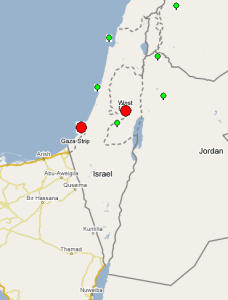Installations
In March and April 2007 we worked with people from Palestine and the University at Bufffalo to install PingER measurement Measurement Points (MPs) in Al Quds University in Ramallah and the Islamic University of Gaza. They were both connected to the Mediterranean fibre optic cable. There is a probability they will lose their connection to the Mediterranean fibre optic cable in Summer 2007.
Al Quds successfully installed PingER2 PingER without help. It has been measuring and reporting since March 23, 2007. It has been very reliable with few losses of data.
Warren Matthews of Georgia Tech had to step in and assist IUGaza in getting PingER2 running. There were problems with the cronjob and possibly ntpd. IUGaza has been monitoring successfully since April 7th, 2007. They did not monitor data all day on April 22. There have been problems on 2 days gathering the data where I have either contacted the IUGaza site contact (Apr 28th to fix the web server) or had to re-run the gathering script (today).
On April 3rd the Al-Quds Open University said they would prepare a new machine and install software. I responded on April 4th and April 17th, but have heard nothing since. I prompted them again today.
The locations of the sites are shown below.
Pinger Coverage
...
| Include Page | ||||
|---|---|---|---|---|
|
Wolrdwide Comparisons
Before we start to compare Palestine (or more specifically the Middle East) to the rest of the world it is useful to look at a World Map of Internet UsersUsers. This shows that for most the developed world (US and Canada, W. Europe, Japan, Taiwan, S. Korea) typically 40% or more of the people have Internet connectivity while for S. Asia it is less than 5%, i.e. typically a factor of 10 less.. For the Middle East Palestine it is about 4.9% while Israel is just under factor of 10 greater (45%). Other nearby countries include Cyprus at 31%, Egypt at 7%, Iraq at 0.1%, Jordan at 11.4%, Lebanon at 13.3%, Saudi Arabia at 10.8%, Syria at 4.2% and Turkey at 17.3%.
From SLAC: 1. Packet Loss, 2. Min RTT to World Regions, 3. Unreachability, 4. Jitter
...
